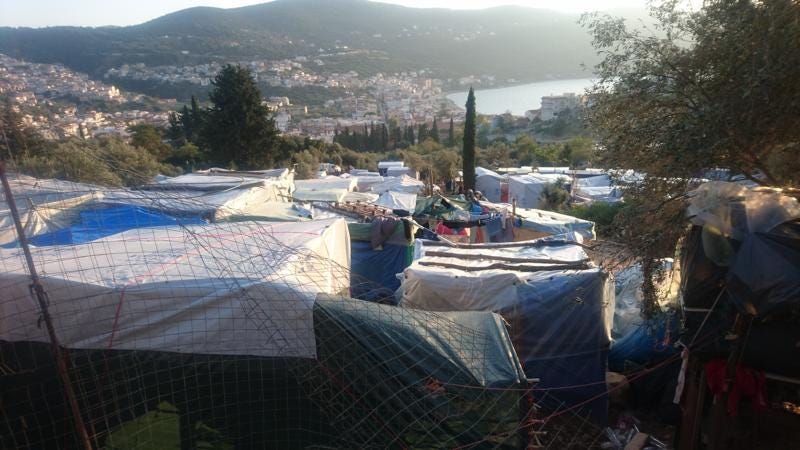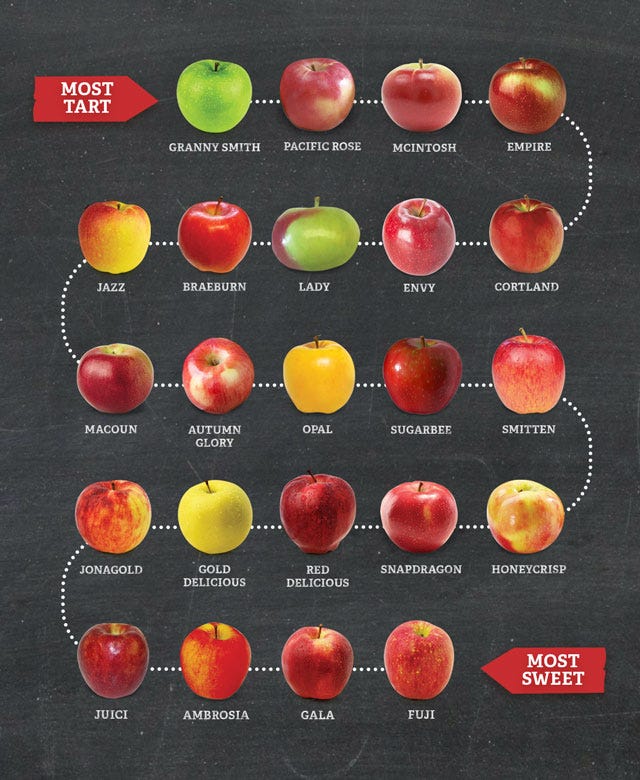Samos: Tales of Shutdown

Happy (?) Friday!
Greetings from the Greek island of Samos. Apologies if this email is a little more 'real' than last week's charmed tour of Ikaría. It turns out there is another aspect to these mythological Greek islands.
ABOUT SAMOS: Samos is an island ruled by legend and beauty. Everything around the virgin landscape is made of colour and light. Each step one takes is a revelation. [Visit Greece]
ALSO: Samos is one of five designated refugee 'hotspots' across the East Aegean, the liquid border between the Middle East and the European Union.
These 'hotspots', which also include the islands of Lesvos, Chios, Kos and Leros, were created in 2016 as holding pens for people wishing to claim asylum in Europe. This means that refugees arriving in Samos are stuck here until their claims have been assessed - a process that often takes a couple of years.
OFFICIAL RESIDENT POPULATION OF SAMOS: 6,251
OFFICIAL REFUGEE POPULATION OF SAMOS: 5,800
These official UNHCR numbers exclude the refugees who have received a refusal to their second asylum application. These people are left uncounted because they dare not go to renew their documents: the police will pick them up, and the government will deport them. Instead, they let their documents lapse and they disappear from the statistics. But they are still here.
ESTIMATED REFUGEE POPULATION OF SAMOS: ~7,000
OFFICIAL CAPACITY OF SAMOS REFUGEE CAMP: 700 (seven hundred)
Last month alone, 2,124 more people arrived on Samos from Turkey. The numbers of new arrivals have more than doubled compared to September last year. [UNHCR]
~
The refugees on Samos predominantly live in and around the refugee camp, on the hillside that overlooks the island's main town. A few are able to rent accommodation in the town, but most live in shelters and tents pitched on the steep slopes.
The steep slopes.
As I write this email to you, the sun is shining on another bright October day. Like me, you probably have a strong image in your mind of the Greek islands in summer: vast blue skies and a sun that bakes. In summer.
The Samian winter - which runs from the end of October until mid-April - is perhaps mild by British standards (although British standards do tend to assume a house and central heating).
But the rain.
We had the first sighting last Friday. A storm broke while I was leaving Ikaría. The wind blew, the rain gushed, local Greeks ran for cover, children screamed, and the power cut out for several hours.
Over winter, Samos gets more than twice the rainfall that London does. The downpour turns the panoramic refugee camp into a mudslide. Worse. Outside of the official camp (population 700), there are few (if any) toilets: 6,000 people with little choice but to shit and piss wherever they can.
Their cheap tents are washed away every winter on a tidal wave of mud and piss and shit.
~
On Samos, there are a dozen or so refugee support organisations who do almost all the work necessary to give these people some hope of a future on planet earth, let alone in Europe.
There are organisations that offer legal advice; others that hold language classes in Greek, English, German, French, Farsi and Arabic; some that cook and serve food (the less said about the food provided by the camp the better); others that put on fitness classes for kids and adults.
These solo volunteers, grassroots organisations and larger NGOs exist only so long as the Greek authorities, including the camp administration, shrug their shoulders or turn a blind eye.
I won't repeat what has been said to me, but I haven't yet heard a single good word said about the leader of the camp administration. It is fair to say that none of the grassroots organisations have any kind of a relationship with the people that run the camp.
When I arrived last week, all the volunteers I spoke to told me that the local authorities were trying to shut down all the refugee support NGOs, harassing them with spot-checks from the mayor's office, the police, the health service, the fire department, the building regulators and the tax office.
Today it happened.
Starting at 9.30am this morning, representatives of every branch of local government marched en masse into the offices, kitchens, warehouses and schoolrooms of all the refugee support organisations on the island. It was an overwhelming display of power.
Do you have this certificate? Do you have that invoice? Where are this man's papers?
~
I will have to leave you on a cliff-hanger, I'm afraid. As I write, an emergency meeting of NGO coordinators is taking place. Right now, people who are only trying their best to help are licking their wounds and comparing the size of their fines.
These tiny organisations, funded by dozens - hundreds - of small-time donors like you and me, are under threat of gargantuan fines up to €10,000 for the slightest infraction - a missing invoice for tomatoes or a building certificate they didn't realise was (or has mysteriously become) necessary.
Needless to say, the cost of such fines would be unbearable. Then who will teach Greek, English or German? Who will show a path through the asylum labyrinth? Who will feed the hungry?
For the past two months, volunteers at one community restaurant have fed around 550 refugees every day, serving a free lunch to the camp's most vulnerable residents, including the elderly, disabled, and pregnant and breast-feeding women.
But with the authorities seemingly determined to shut these NGOs down, how long can this restaurant survive? The restaurant founders spent four months getting all the right certificates and licenses to run a kitchen above board. But if the shut-down is not successful today, then what about tomorrow? Tomorrow's tomorrow?
Then everyone will have to go back to standing in line from two in the morning to get a breakfast of one plastic-coated croissant and a carton of juice.
After today's assault, perhaps some of the NGOs here on Samos will have to end their operations. Perhaps the crack-down was also intimidation, a message to the EU from a Greek government that has had enough. Perhaps, to some extent, life will go on as before.
This is Greece; we don't know.
If you like this sort of thing, then you'll probably also like my back catalogue of over 500 posts, all found at davidcharles.info.

Bleach for the Stars! is still open!
Everything's Totes - only 2 days left to listen :(
Tonypandy’s cultural exchange with Aarhus, Denmark is in full swing. Sabrina gives her new stylist a double Dutch welcome, but Richie suspects Yorrick is not who he seems to be.
Everything's Spikes
Bleach for the Stars has some very special clients - hedgehogs. But how will their only customer get her hair done when the senior stylist has turned the salon into a hog parlour?
Everything's Casts
Richie can't get any guests for his new podcast because the whole town is watching the rugby. But when the match is hit by sabotage, can Sabrina’s god uncle Derek save the day?
Everything's Plants
It’s Bleach for the Stars' fifth birthday and only Richie’s dad has turned up for the party. With no festivities to speak of, will Sabrina sign the lease for another five years?
How do people afford to exist these days? A worthwhile question to ask, especially when hanging out with people who volunteer 50-100 hours a week to supporting refugees.
'People assume that everyone who's here for a very long time is running off daddy's money,' one British volunteer in Athens told me. 'They don't see that now I'm going home after a really, really long day to earn money.'
For this volunteer, work means online tutoring late into the night. She acknowledges that she's lucky to have such a job: well paid, flexible hours, flexible location.
Lucky? It feels like many people I love are scraping along the margins of capitalism, surviving from gig to gig, to support their more meaningful work.
Another friend, whose life's work is as a wonderful anarchist publisher, has just started an online proof-reading and transcription business (not exclusively for anarchists, he's great, go and use him). This is life in the 'gig' economy.
My friend Tara has recently set up her first crowdfunding campaign to help launch a national tour of her latest dance piece. It's inspired by birdsong. This is life in the 'gig' economy.
'All the refugee volunteers go and get jobs. Other people come for a month because that's what they can afford and then they leave.'
Maybe these volunteers leave Greece to go back to highly meaningful lives, working a day job that increases the sum of sentient joy in the world. Maybe they don't. Maybe their life's work is here, in Greece, helping people resurrect lives in a world of catastrophe.
This is life in the 'gig' economy.
~
Sorry - I don't have a comfortable conclusion to wrap up that line of thought. So instead I'll wish you Happy World Homelessness Day and with the news that Crisis at Christmas is now open for applications!
Of course, the UK shouldn't really need a national charity for homeless people, but given that apparently it does, there is no better way I can think of spending a few days over the festive season.
If you fancy getting involved and want company, then I'm doing the afternoon shift at the South London Centre on the 23rd, 28th and 29th. See you there?
~
My plan is to stay on Samos for another week, but I also want to see things from the other side of the border. Turkey is only a couple of miles away. With €10 and a flash of my passport, I could accomplish in an hour what costs some people their lives.
On a more positive note: I've found a Greek teacher here in Samos - ελλα, ελλα!
Much love, d:c:

CREDITS
David Charles wrote this newsletter. David is co-writer of BBC Radio sitcom Foiled, and also writes for The Bike Project, Forests News, Elevate and Thighs of Steel. Reply to this email, or read more at davidcharles.info.



